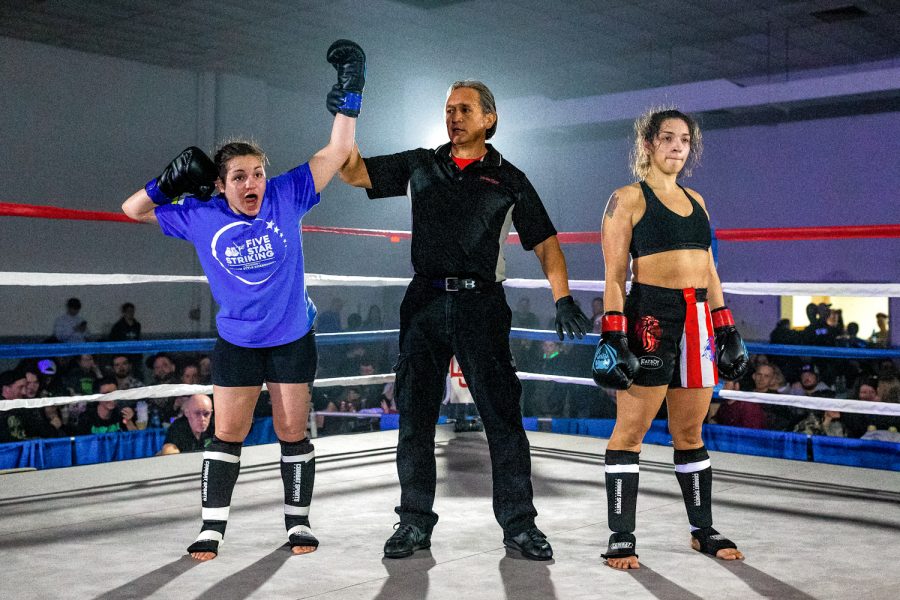‘I don’t feel like she’s ever going to lose’: An Iowa woman’s quest to go pro in MMA
Years of training in mixed-martial arts, kickboxing, jiu jitsu, and more have prepared Saleena Ziadeh, a diabetic, first-generation American, for her chance to go pro.
April 28, 2019
Saleena Ziadeh stands inside a mixed martial arts cage, 30 feet opposite her opponent and nine minutes away from improving her amateur mixed-martial arts record to 3-0. It’s a chilly spring evening in April, although it’s increasingly warm inside due to a few hundred spectators — many of whom are here to see her.
Saleena is a plug of muscle, 23 years old, standing 5-2 and fighting tonight at 145 pounds. The sides of her head are shaved and her auburn hair, usually worn in a topknot to keep it out of the way while she trains, is instead braided into rows. She stares across the ring in the direction of her opponent but seems to be looking past the other fighter, staring into the darkness of the Teamsters Union Hall in Cedar Rapids, beyond the bright lights of the cage.
Where other fighters might amp themselves up before the fight, Saleena stands still, her jaw clenched, only coming out of her corner to salute the crowd as the ring announcer introduces her. She returns to her corner and bounces her back three times off the chain-link fence behind her.
Her fight is not the main fight of the night, but this is a distinctly pro-Saleena crowd with cries of “Let’s go, Saleena” rising above the growing roar inside the Union Hall. At least a dozen of the fans clapping, waving, and yelling are clearly Saleena supporters, garbed in “Team Ziadeh” shirts sporting her signature symbol: a panda bear wearing a pair of boxing gloves, one labeled “diabetes,” and the other “sexual abuse.”
“Ready?” the ref yells in her direction. Saleena gives a sharp nod, and the ref signals the start of the fight. Saleena’s hands snap up to a ready position, and she charges toward the center of the cage.
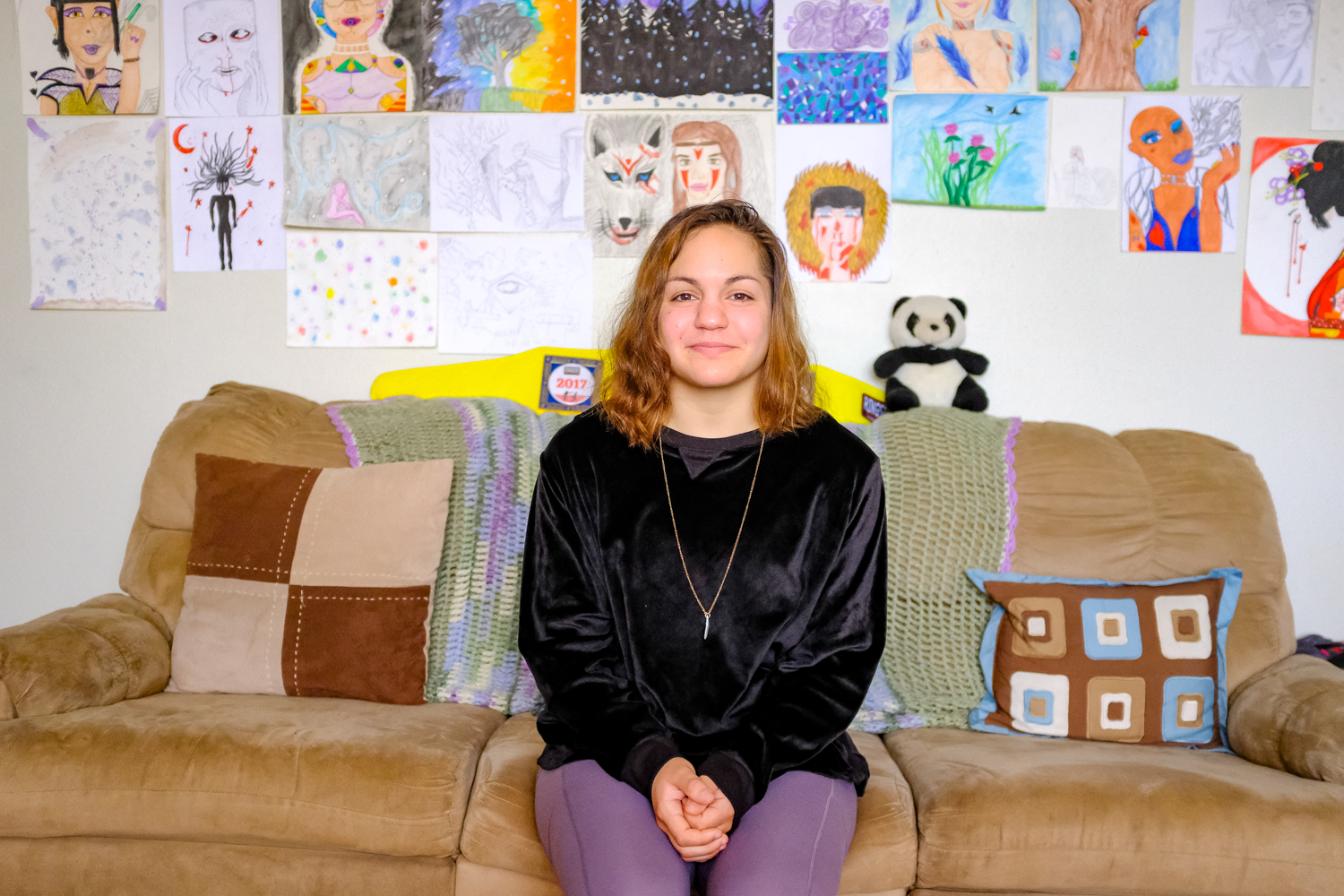
Aspiring professional MMA fighter Saleena Ziadeh sits on the couch in her Cedar Rapids apartment on Sunday, April 7, 2019.
“I’d enrolled Saleena in tae kwon do when she was 14 as a means of building self-defense — or, at least, self-confidence,” father Ramon Ziadeh said.
Saleena, the daughter of a Lebanese immigrant, grew up in Cedar Rapids, and athletics was an escape from a chaotic childhood that provided two of the major motivations driving her as a fighter years later.
First, when Saleena was around 6 years old, she experienced sexual exploitation at the hands of her mother’s adoptive father. When Saleena was 14, she testified against the man at trial, and he was found guilty in federal court of production of child pornography. The then 78-year-old man was sentenced to 10 years in prison.
Second, Saleena was diagnosed with Type-1 diabetes at age 6.
“It was hard to understand why I had to sit out of gym class,” she said.
Diabetes proved to be a serious opponent when she was younger — she came down with diabetic ketoacidosis, landing her in the hospital and causing her to fall behind in school. Learning to control it, however, allowed her to eventually compete in track, swimming, and soccer in high school.
Saleena took to tae kwon do quickly and stuck with the sport for five years, earning a second-degree black belt and, by the end of her time with the sport, was teaching it at the YMCA in Cedar Rapids. It was her first job.
Her experience in tae kwon do led her to develop an interest in other combat sports, so she started training in Brazilian jiu-jitsu and boxing at two clubs in Cedar Rapids.
Around this time Saleena began to think that becoming a professional MMA fighter might be in her future after having a conversation with older sister Fabiola. At the time, Fabiola was dating a professional MMA fighter, and the two sisters were watching one of his fights on TV when Fabiola asked, “What if you had the chance to fight Ronda Rousey?”
Until this point, Saleena had never thought about fighting professionally, but, as she said, “after training in all of these sports, I thought: ‘Might as well put it all together.’ ”
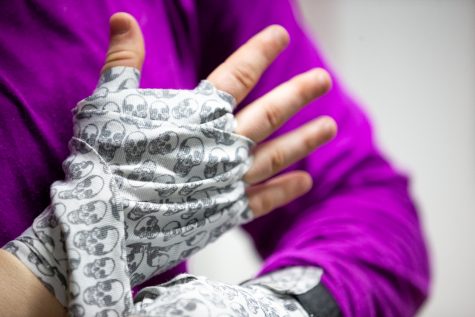
Saleena Ziadeh wraps her hands before putting on her gloves for boxing training at Down to Fight MMA in Cedar Rapids on Thursday, March 14, 2019.
She started by training MMA at a gym in Cedar Rapids where she met Bill Kamery, who became her boxing coach. When Kamery moved to Down to Fight MMA, Saleena followed him. Thus began a multiyear quest to become a professional MMA fighter. She needed to come up through the ranks of being an amateur fighter, however, before she could make the pros.
The first professional stop for an aspiring female fighter is the Invicta Fighting Championships. While the UFC or Bellator leagues might be more familiar to male MMA fans — although both leagues have female divisions — starting with Invicta makes more sense for a young female fighter.
“Some people might watch UFC and turn off women’s fights — but if you’re watching Invicta, you’re there for the women,” said Jared Vevera, Saleena’s boyfriend and training partner.
So far, Saleena has fought in amateur boxing, kickboxing, and MMA and lost only one fight to date. To get invited into Invicta, she needs to continue to dominate her opponents. A few more MMA wins — particularly dominating ones — and she might be ready to go pro.
To be effective as a mixed martial artist, a fighter must combine several different disciplines.
“The days when you could just be really good at one thing are long gone,” Vevera said.
Saleena splits her training time between Down to Fight for striking, kickboxing, and MMA training and Tipping Point Brazilian Jiu-Jitsu for grappling training. She trains full-time; she quit her job to focus on going pro.
Even getting into the amateur ranks, however, has proven challenging, because being both a diabetic and a female fighter impose certain restrictions on how she is able to develop.
Diabetes limits her ability to cut weight, which, in turn affects how she trains. She doesn’t lift weights — given her body type, she can easily put on muscle, but cutting weight quickly is difficult because of her need to monitor her blood sugar levels.
But given her short stature, fighting at a higher weight class means fighting girls who are taller and have a longer reach than she does. So she limits her conditioning to running at the downtown Cedar Rapids YMCA and circuit training at Down to Fight.
And while the sport has started to change, female fighters weren’t especially common when she started in 2012, so finding quality female opponents and sparing partners in eastern Iowa has proven to be a challenge.
“It’s hard to find opponents, period,” she said. “You’ve got to take what you can get.”
For fights, she has seen action against fighters from around Iowa and as far away as Colorado. But for training, she goes up against male fighters every day who outweigh her by dozens of pounds.
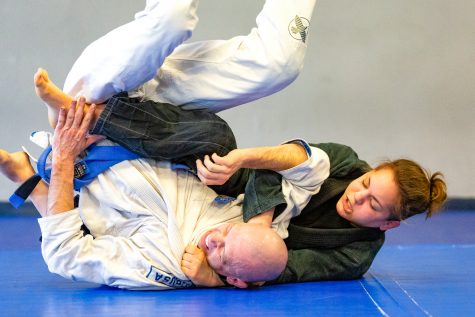
Saleena Ziadeh grapples with another fighter at Tipping Point Brazilian Jiu-Jitsu in Cedar Rapids on Saturday, March 30, 2019.
“Saleena? She’s tougher than half the guys in the gym,” said a fighter at Tipping Point as he walked along the edge of the mats.
Saleena’s view on the matter is blunt: “I like training with guys. They’re going to make you work harder.” And during training sessions, it’s clear that everyone is working hard — Saleena and her male teammates come up gassed at the end of five-minute practice sessions at both Down to Fight and Tipping Point.
The only obvious difference is that the male fighters don’t use their weight advantage — which can be substantial.
“If a guy just lies on top her, they’re not getting any training value from that either,” said Derek Loffer, the owner of Down to Fight and Saleena’s MMA coach.
Saleena, however, observed that the other fighters weren’t above taking some advantages on the mat, describing their attitudes as, “When’ve you’ve got a girl whooping up on you, it’s like, ‘All right, I’m gonna settle you down.’ ”
She did concede though that “obviously, they’re not going to go 100 percent … but I hit hard enough.”
When not sparring with others at Down to Fight, Saleena grapples with friends and family. Her regular Friday night jiu-jitsu partner is her older sister Eleesa, 25, who has a sports background in high-school soccer and track, and started training in jiu-jitsu four years ago, largely because of Saleena’s influence.
The sisters are relatively evenly matched, both ranked as blue belts, but while Eleesa can hold her own against her sister, Saleena is usually the dominant fighter.
“I can get her in an arm bar, but no takedowns for sure,” Eleesa said. “I don’t like to stand up with her.”
Saleena’s other regular sparring partner in jiu-jitsu is her boyfriend, Vevera. He is a more experienced grappler than she is and works as an instructor in the dojo.
He laughs when asked what it’s like training his girlfriend.
“It has its challenges,” he said. “We get into these little fits with each other on the mat. It’s like, if anyone else talked to me like this when I was trying to help them, I wouldn’t do it. But we do have a pretty good balance.”
Besides sparring at Tipping Point, Vevera will occasionally corner for Saleena’s fights.
“I know her ground game very well,” he said.
“That’s why it’s so hard rolling with him,” Saleena said.
Ultimately though, the interaction between Saleena and the other fighters in the gym makes almost no distinction about her being a woman. Loffer said, “She’s earned her place here in the gym, and guys have learned if they give her any rope, she’ll really put it on them.”
Saleena’s demeanor outside of the ring stands in stark contrast to the woman in the fights. She seems as if she is constantly trying to suppress the urge to start smiling or giggling at any moment.
Between her various gyms and workout routines, Saleena can be in training three or four times a day, but when not doing so, she tends to hang around the apartment she shares with Vevera and her cat Russia, which is littered with drawings and panda-theme mementos.
“Pandas are my spirit animal,” Saleena said. “I was fascinated with Asian culture as a kid.” Her siblings eventually took to calling her “panda bear.”
Today, she sports a large tattoo covering her right upper arm depicting two pandas — one eating bamboo, the other enraged. “It represents that I’m a lover and a fighter.”
Around the apartment, Saleena does some of the cooking — she prefers Lebanese cuisine — but she spends a lot of her free time painting and drawing, working mostly in pencils, watercolors, and acrylics.
“I’ve never really taken any classes on it, but I just really like arts and crafts,” she said.
In the hours leading up to her fights, however, Saleena’s demeanor changes.
“I like to show up early, talk to everybody and sort of goof around,” she said. “But then I’ll put on my headphones to get into my zone. At that point, I don’t really want to be bothered by anyone.”
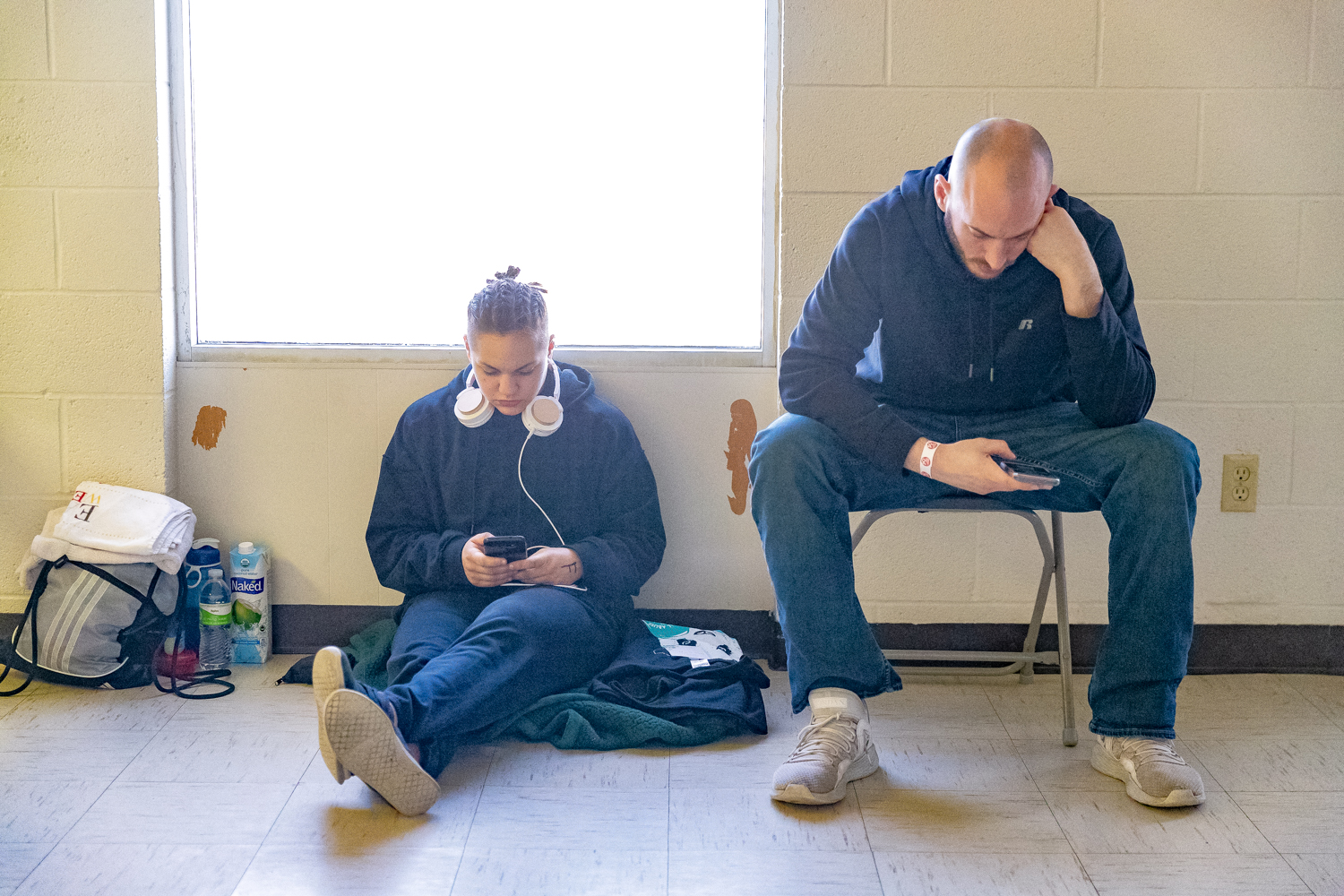
Saleena Ziadeh and her boyfriend Jared Vevera kill time in the locker room before Elite Fight League #4 in Cedar Rapids on Saturday, April 13, 2019.
Back in the cage in Cedar Rapids, Saleena and her opponent close the space between each other and begin to circle. The octagonal cage of black chainlink fence stands in in the center of the Union Hall — the roar of the crowd echoing off the cinder block walls and linoleum tile of the room. Four spotlights mounted at corners of the cage draw every eye in the audience to the two fighters dancing in the ring.
Saleena throws a quick jab, and her opponent goes down, though it’s hard to tell if the other fighter simply slipped as she backed away from the punch. Saleena tries to maneuver on top of her to take the fight to the ground, but the other fighter springs back up. The two women lock up with each other and begin to crash into the sides of the cage.
So far, the fight hasn’t gone as Saleena wanted. “I wanted to get out there, work my hands and start throwing jabs.”
Instead, her opponent has gotten underhooks locked under Saleena’s armpits. All Saleena can do for the moment is throw some knee strikes into the sides of the other fighter.
Saleena wants this fight to be a decisive win. Her previous two MMA wins came in the first round, and to continue to progress as an amateur and be noticed by Invicta, she needs to continue to dominate opponents. That has not always happened.
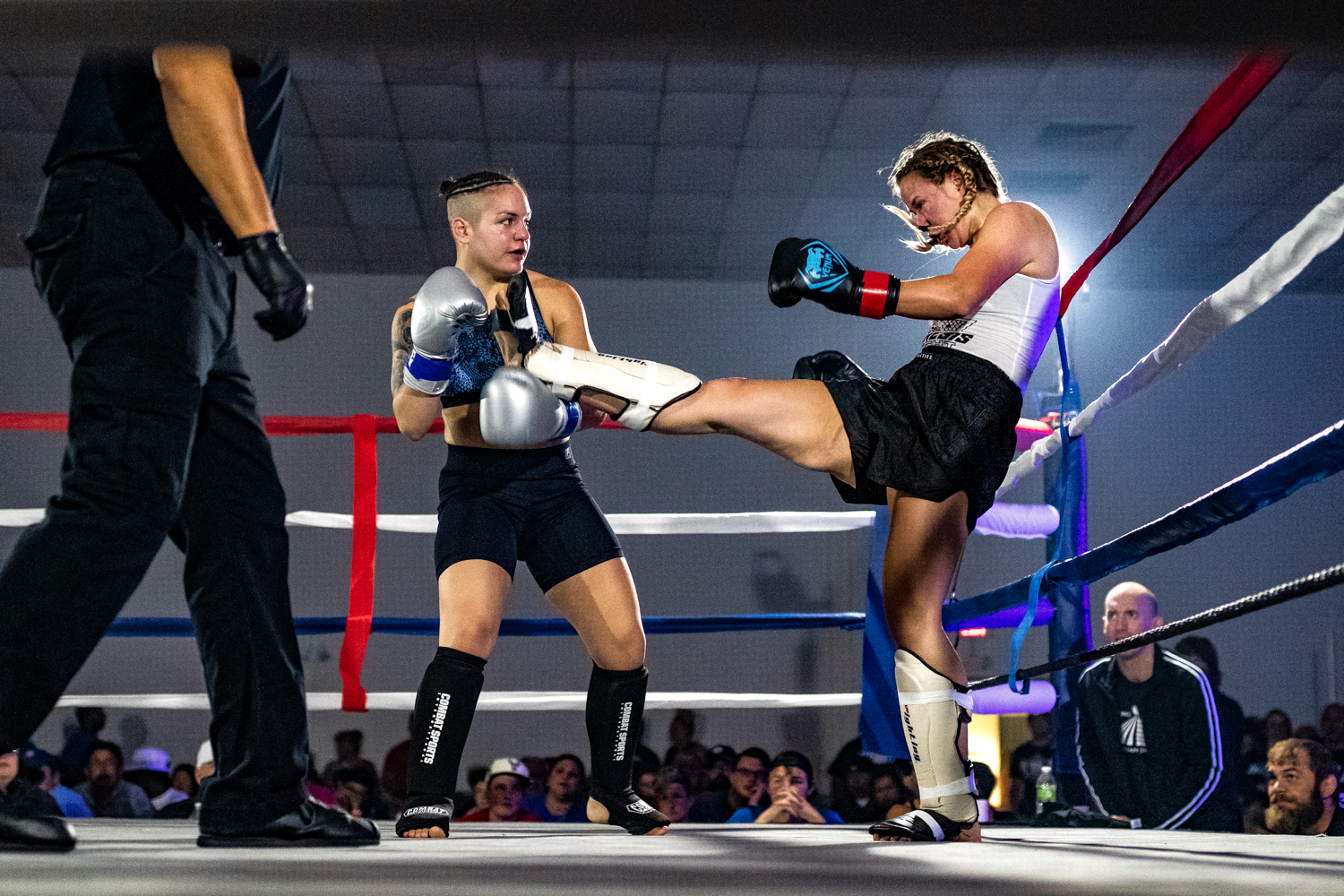
Saleena Ziadeh catches Jemma Breslin’s leg during the Midwest Kickboxing Championship in Cedar Rapids on Saturday, Aug. 18, 2019.
In order to keep a well-rounded skill set, Saleena competes in Dutch-style kickboxing, where she has a record of 2-1 — with the loss coming in August 2018 on a split decision to Jemma Breslin, a fighter from Colorado.
It had been an entertaining fight, declared “fight of the night” with both fighters giving strong performances. Saleena was the aggressor, constantly attacking Breslin. But Breslin landed several head kicks, and from a scoring standpoint, that proved decisive.
“I disagreed with the judges — I believe I won that fight,” Saleena said. “But I shouldn’t have left it in the hands of the judges.”
On this evening in Cedar Rapids, a member of the Iowa Boxing Commission had echoed this very point in the pre-fight-rules meeting, encouraging fighters to leave it all in the ring and not take their chances with the judges. But after the first few seconds of this fight, Saleena hasn’t been able to get clear and rely on her strength — her punching ability.
Despite being skilled in several combat sports, her fists usually prove decisive in a fight. Both of her previous two MMA wins have come via technical knockout by strikes in the first round. In kickboxing, she has been nearly as effective with her wins coming in the third round.
“There’s a difference between boxing gloves and MMA gloves,” Vevera said. “The bigger boxing gloves tend to provide more protection to the other fighter when they block, and the heavier gloves slow you down a little.”
Heavier gloves have not always proven an impediment to Saleena— in her previous fight, a kickboxing fight in March, she scored a dramatic third-round knockout, catching her opponent with a left hook to the jaw and dropping the other woman on the mat. But so far, she has yet to connect on a punch in this match.
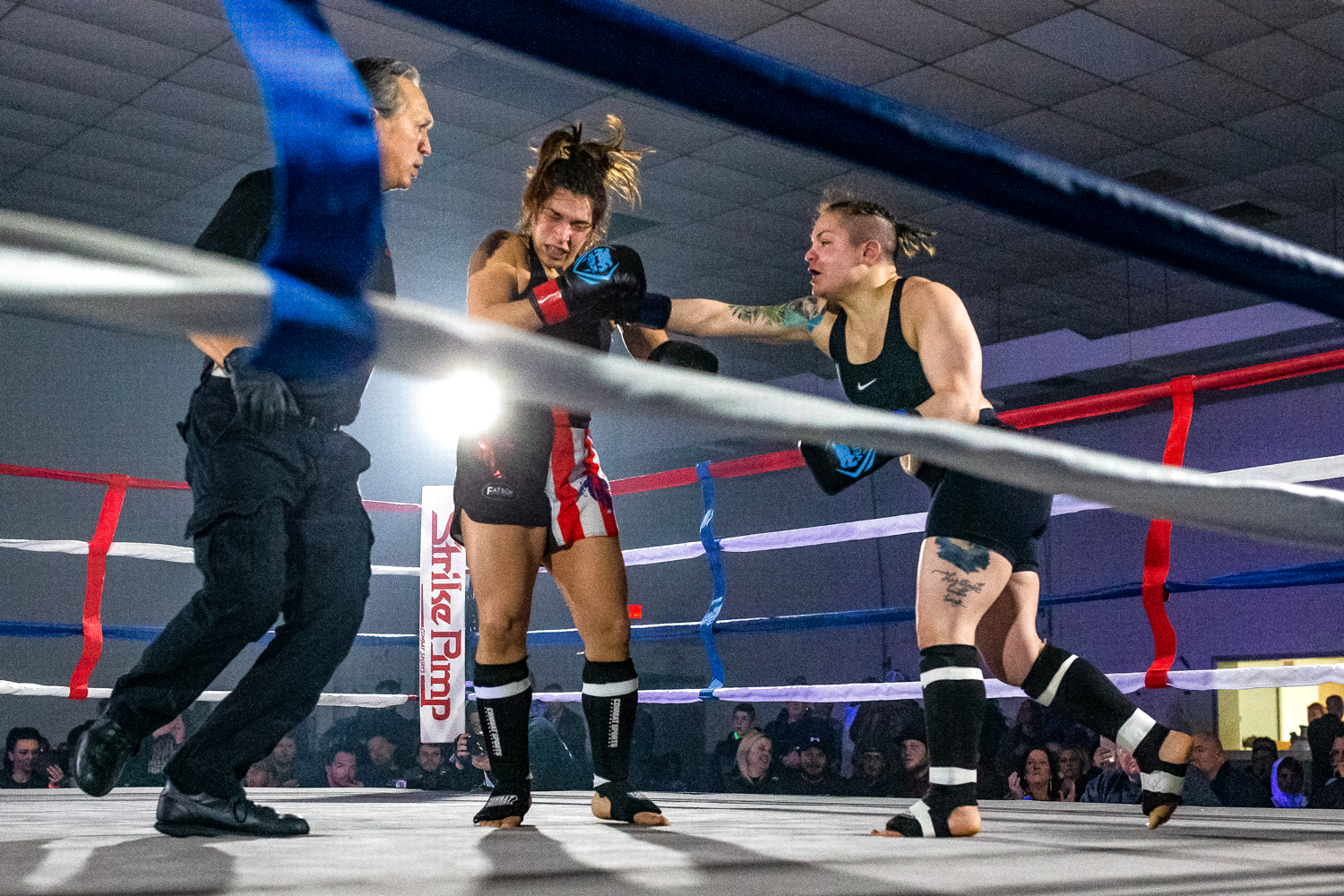
Saleena Ziadeh lands with her right against Vanessa Lebron during the Midwest Kickboxing Championship in Cedar Rapids on Saturday, March 2, 2019.
The fighters, still locked together, smash into the fence and finally Saleena is able to untangle her arms. She quickly throws a punch, and her opponent covers up her head with both hands while still staying almost bent over at the waist. Saleena immediately goes on the attack and unleashes a flurry of one-two jabs on the other woman’s head.
Selena lands at least 20 punches. Finally, the ref jumps in and stops the fight. Saleena barely reacts, taking a small hop as she turns away and jogs back to her corner.
She hasn’t always reacted so nonchalantly to a win. After her knockout win in March, she screamed and jumped up, then stomped around the ring.
“I’d dedicated that fight to family friend who’d just passed away, so that was such an emotional release,” Saleena later recounted.
If that fight had been an emotional release, this fight was another day at the office. The referee brings both women out of their corners, and Saleena is declared the winner — technical knockout at just 38 seconds in the first round. Saleena is barely breathing hard, with any exhaustion due more to adrenaline than exertion. Once again, her punches have brought another victory.
Saleena’s is the last undercard fight of the night with a final intermission before the main events start. A large portion of the crowd takes advantage of the break to depart, streaming past Saleena, who is in the front entrance of the Union Hall, shaking hands and posing for photos with friends, family, and supporters. She’s done what she needed to do tonight — score another decisive first-round win. All that’s left to do now is prepare for the next fight — another MMA fight in May.
Saleena’s sister and sparring partner Eleesa, who was at the fight, made her way to the exit with the rest of the crowd.
Asked how she feels about seeing her sister get into the ring, she replied succinctly: “I’m not worried at all. I don’t ever feel like she’s going to lose.”

